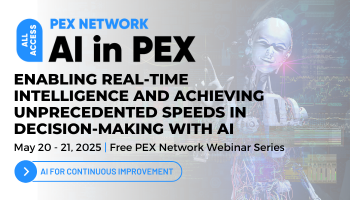Gartner publishes RPA Magic Quadrant™, sustainability drives digital transformation & AI investment – PEX Research & Reports News
Comprehensive data pools and robotic process automation enhance process mining, digital transformation adoption rates increase in the US automotive market
Add bookmark
PEX Network’s weekly news bulletin rounds up the latest research, reports and publications in operational excellence (OPEX), digital transformation, artificial intelligence (AI) and automation, business process management (BPM), process mining and process intelligence and more.
This week includes:
- Gartner publishes Magic QuadrantTM for Robotic Process Automation
- Sustainability drives digital transformation and AI investment
- Researchers assess using RPA logs for process mining
- Digital transformation adoption rates continue to grow in US automotive market
- Comprehensive data pools enrich process mining
Don't miss any news, updates or insider tips from PEX Network by getting them delivered to your inbox. Sign up to our newsletter and join our community of experts.
Gartner publishes Magic QuadrantTM for Robotic Process Automation
Analyst firm Gartner published the Magic QuadrantTM for Robotic Process Automation (RPA), evaluating 13 enterprise RPA vendors to help businesses make the best choice for their automation needs. It outlined key trends shaping the RPA market in 2024, including AI being at the core of RPA vendor strategy, the development of generative AI and the role of business orchestration and automation technologies. Furthermore, it cited the RPA market’s value (US $3.2 billion) and year-over-year (YoY) growth (22 percent).
Based on a set of criteria, the research grouped RPA technology providers into four categories: Leaders, Visionaries, Niche Players and Challengers. “RPA continues to be a core software market for improving operational efficiency with tactical automation,” wrote the authors.
Sustainability drives digital transformation and AI investment
Business investments in digitization, AI and data analytics are being driven by sustainability goals, according to a new survey from Schneider Electric. The firm’s Sustainability Index 2024 questioned over 500 business decision-makers around Australia. It found that digital technology plays a key role in achieving sustainability in almost three-quarters of companies, with a majority (53 percent) increasing spend on digital transformation. Furthermore, despite concerns about the energy consumption of AI, more than a third of businesses are using or planning to use AI to help manage their decarbonization transformation.
“The role of technology is critical in the management of the net zero transition,” commented Lisa Zembrodt, principal of sustainability business for Schneider Electric. “While development and use of AI tools can be demanding on power supply and grid systems, these tools can also offer great support for business in monitoring and controlling emissions. This survey shows companies are increasingly recognizing the critical role technology plays in moving to a low carbon economy, with most investing more in digital transformation than they were three years ago.”
Researchers assess using RPA logs for process mining
A new research paper published in the Information Systems journal outlined an approach developed to enable using RPA logs for process mining, proposing tailored measures to analyze merged bot and process logs. “We use the design science research process to structure our work and evaluate the approach by conducting a total of 14 interviews with experts from industry and research,” wrote the authors. “We also implement a software prototype and test it on real-world and artificial data.”
This approach contributes to prescriptive knowledge by providing a concept on how to use bot logs for process mining and brings the research streams of RPA and process mining further together, the researchers added. “It provides new data that expands the possibilities of existing process mining techniques in research and practice, and it enables new analyses that can observe bot-human interaction and show the effects of bots on business processes.”
Digital transformation adoption rates continue to grow in US automotive market
The rate of digital adoption for contracting and transaction documentation in the US automotive market increased by 29 percent in the second quarter for lenders and retailers, according to analysis by Wolters Kluwer Compliance Solutions from its Q2 Auto Finance Digital Transformation Index. The Index outlined critical digital transformation drivers and their impact on future business processes across the vehicle purchase lifecycle as well how service provider professionals and automotive lenders adapt to new digital demands in a rapidly shifting lending environment.
“In having reached the midway point of 2024, we’re reminded of the true strength of digital adoption across an industry that is still operating on legacy philosophies,” said Tim Yalich, head of auto strategy for Wolters Kluwer. “A growing number of automotive businesses and professionals continue to adopt digital strategies for their back-office workflows and documentation. More impressively, despite a ransomware attack that threatened many businesses into a paper-based environment, many saw opportunities to pivot and remain digital, validating the importance of digitizing their entire workflow operations to meet customer needs.”
Comprehensive data pools enrich process mining
A new research paper proposed generating event data with intentional features for benchmarking process mining. “Process mining solutions include enhancing performance, conserving resources, and alleviating bottlenecks in organizational contexts,” the authors wrote. “However, as in other data mining fields, success hinges on data quality and availability. Existing analyses for process mining solutions lack diverse and ample data for rigorous testing, hindering insights’ generalization.”
The researchers’ framework is designed to provide the capability to generate an event data benchmark, which covers unexplored regions. “Therefore, our approach leverages a discretization of the meta-feature space to steer generated data towards regions, where a combination of meta-features is not met yet by existing benchmark datasets.” They discovered that providing a comprehensive data pool enriches process mining analyses and enables methods to capture a wider range of real-world scenarios, improving evaluation quality. “Moreover, it empowers analysts to uncover correlations between meta-features and evaluation metrics, enhancing explainability and solution effectiveness.”
All Access: AI in PEX is 2025

All Access: AI in PEX 2025 is designed to address these challenges and empower organizations to successfully integrate AI into their process improvement initiatives. The content series will bring together industry experts, thought leaders, and practitioners to share insights, best practices, and real-world case studies.
Register Now

















